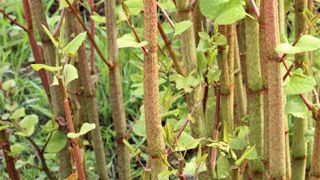How you could be fined £5,000 or imprisoned over Japanese knotweed
If you have the invasive plant species you can face civil or legal action if you do not deal with it properly. Here we show you how to avoid these penalties for Japanese knotweed

Homeowners can face a hefty fine if they allow the invasive plant Japanese knotweed to spread to other properties or don’t dispose of it properly.
Japanese knotweed removalcan be tricky and derail progress on your build or renovation plans, so it pays to be aware of the risks it presents.
Here we show you what penalties you can receive from Japanese knotweed and how you can avoid them.
What is Japanese knotweed?
Japanese knotweed (Fallopia japonica) was introduced to the UK during the Victorian era and gardeners were attracted to its heart-shaped leaves and exotic flowers, but the plant grows aggressively and its extensive root system can cause damage to buildings and roads.
如果任其自生自灭,极其fast-growing plant will find its way into weak spots in structures, cause damage to hard surfaces, such as patios and pathways, block drains, and widen existing cracks in brickwork.
It's important to understand what it looks like before it inflicts damage, so take a look at our guide onJapanese knotweed identification.
Japanese knotweed UK law: Why are people being fined?
Under the provisions made withinSchedule 9 of the Wildlife and Countryside Act 1981, it is an offence to cause Japanese knotweed to grow in the wild.
Experts at invasive plant specialistsEnvironetestimate that approximately 5% of homes in the UK are affected by Japanese knotweed, either directly or indirectly from a neighbouring affected property, which can lead to civil or legal action.
UK Government guidelines state that you must dispose of Japanese knotweed waste off-site by transferring it to a disposal facility that’s permitted, such as a landfill site that has the right environmental permit.
It adds that householders could be fined up to £5,000 or be sent to prison for up to two years if you allow contaminated soil or plant material from any waste they transfer to spread into the wild.
So, if you cut back knotweed or dig it up and take it to your local waste and recycling centre that does not have the right environmental permit, you could potentially be fined or sent to prison.
Then there is the threat of civil litigation, which was laid bare earlier this year when a furniture designer successfullysued his home's previous owner for £200,000after finding Japanese knotweed behind the garden shed.
How to avoid being prosecuted for Japanese knotweed?
The first thing to do is act fast – the sooner you tackle removal the cheaper and easier it will be. The second thing is do not attempt to remove it yourself because you could easily make the problem worse.
"Don’t try and dig Japanese knotweed out yourself. Movement of the ground is likely to stimulate growth and if a piece of rhizome the size of a fingernail is left behind, it can regrow," says Nic Seal, managing director of Environet.
When it comes tohow to kill Japanese knotweed, there are several methods commonly used and the one you opt for will effect how much you pay to rid yourself of the problem. While both herbicide treatments and complete removal are options offered to homeowners by professionals, removal tends to be the safest option and the one most commonly chosen despite its higher cost implications.
According to Environet, the factors that determine how much your quotes for Japanese knotweed removal are likely to come in at include:
- The quantity of knotweed and its maturity
- Site conditions
- Access
- The depth and spread of the rhizomes
- Ground conditions
- Location
- The kind of guarantee you require
Paul Hampson, CEO of CEL Solicitors, explained you must properly remove Japanese knotweed or else you could be fined, as he stated: "You can't simply pull it out of the ground. If you have it on your land you are responsible for stopping it from spreading."
"Japanese knotweed can spread from a stem as small as 1cm, so any illegal dumping is a cause for real concern. If you find the invasive plant on your land you should not attempt to treat it yourself unless you have the appropriate knowledge and experience.
"You should seek help immediately from experts to identify the scale of the problem and work with a specialist company that can dispose of the plant legally and safely. The plant can be sprayed with approved herbicide chemicals and can take up to three years to be treated successfully.
"It can also be buried, but permission must be sought from the Environment Agency, as well as burned, but again proper permissions must be sought before this is carried out."
You can get an idea ofJapanese knotweed removal costwith our in-depth guide.
Get the Homebuilding & Renovating Newsletter
Bring your dream home to life with expert advice, how-to guides and design inspiration, direct to your inbox.
Sam is based in Coventry and has been a news reporter for nearly 20 years. His work has featured in the Mirror, The Sun, MailOnline, the Independent, and news outlets throughout the world. As a copywriter, he has written for clients as diverse as Saint-Gobain, Michelin, Halfords Autocentre, Great British Heating, and Irwin Industrial Tools. During the pandemic, he converted a van into a mini-camper and is currently planning to convert his shed into an office and Star Wars shrine.
Most Popular
Bring your dream home to life with expert advice, how-to guides and design inspiration, direct to your inbox.
Thank you for signing up to Homebuilding. You will receive a verification email shortly.
There was a problem. Please refresh the page and try again.

